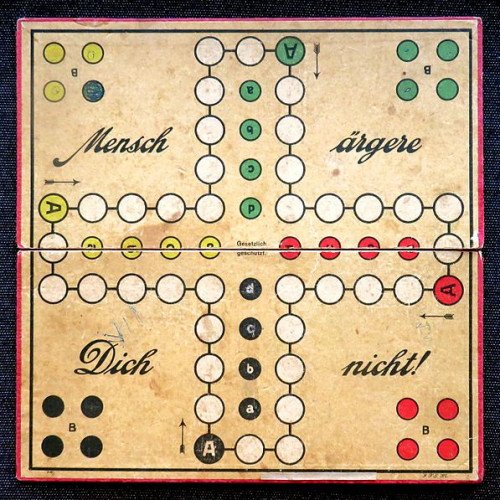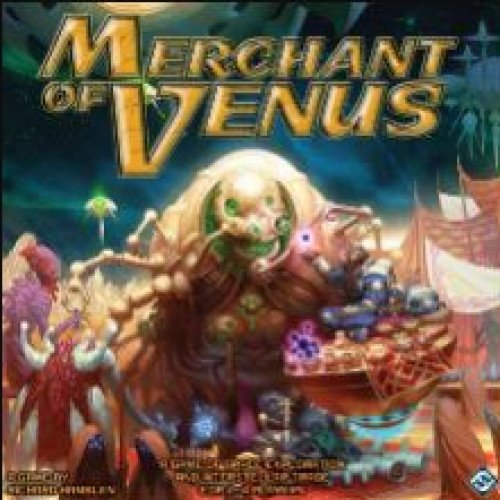"MENSCH ÄRGERE DICH NICHT" vs "MERCHANT OF VENUS"

MENSCH ÄRGERE DICH NICHT
Mensch ärgere Dich nicht (English: Man, Don't Get Angry) is a German board game (but not a German-style board game), developed by Josef Friedrich Schmidt in 1907/1908. Some 70 million copies have been sold since its introduction in 1914 and it is played in many European countries The name derives from the fact that a peg is sent back to the "out" field when another peg lands on it, similar to the later game Sorry!. It is a cross and circle game with the circle collapsed onto the cross, similar to the Indian game Pachisi, the Colombian game Parqués, the American games Parcheesi and Trouble, and the English game Ludo. The most played variant of the game can be played by 2, 3, 4 players – one player per board side. The special one has a pattern for 6 players. Each player has four game pieces, which are in the "out" area when the game starts, and which must be brought into the player's "home" row. The rows are arranged in a cross position. They are surrounded and connected with a circle of fields, over which the game pieces move in clockwise direction. There are three fields on each side of the board. At the beginning of the game, the players' pieces are placed in the four fields marked "B" on the far left side, the "out" section. The coloured field just left of centre, marked "A", is each player's "start" field. The white field just to the right of the start field leads to the "home" row, marked "a", "b", "c", "d". Each game piece enters the circle at the "start" field ("A"), moves (clockwise) over the board and finally enters the "home" row. The first player with all of their pieces in their "home" row wins the game. The players throw game dice in turn and can advance any of their pieces in the game by the thrown number of dots on the die. Throwing a six means bringing a piece into the game (by placing one from the "out" ("B") area onto the "start" or "A" field) and throwing the dice again. If a piece is on the "A" field and there are still pieces in the "out" area, it must be moved as soon as possible. If a piece cannot be brought into the game then any other piece in the game must be moved by the thrown number, if that is possible. A commonly played variation allows a player who has no pieces in the circle of fields to have three tries to throw a six. Pieces can jump over other pieces, and throw out pieces from other players (into that player's "out" area) if they land on them. A player cannot throw out his own pieces, though he can advance further than the last field in the "home" row. A player can be thrown out if he is on his "start" field.
Statistics for this Xoptio

MERCHANT OF VENUS
Merchant of Venus is a board game, published in 1988 by Avalon Hill, set in an unexplored part of the galaxy during a reawakening of galactic civilization. Players move around the board as traders discovering long forgotten pockets of civilization and buying and selling goods. The game can be played by one to six players. In tournaments it is usually played by four players. The solitaire version, which relies heavily on combat with a militaristic race, has different game mechanics. The name of the game is a pun on the Shakespeare play Merchant of Venice. The planet Venus does not actually appear in the game. The length of the game impacts on the strategy. In short games trade routes will not be well developed whereas in longer games extensive trade routes will develop. The game has at least two predictable phases. In the early part of the game, players are discovering the identity of the cultures in the fourteen solar systems available for trade, and often find valuable artifacts from an earlier period of civilization. When discovering a culture, players get bonuses, which they can use to buy goods. Once the board has been largely revealed, the game focuses on moving goods from cultures that build to other races that demand the goods. Often the winner will be a player who is effective in investing his mid-game purchase in factories and orbital ports that pay a commission when other players use the ports. Judging whether a player is coming up on a win often consists of looking at the number of deeds the player owns. Later in the game, calculating the sale, purchase and commission on several transactions can become a relatively complicated event, especially when players are expecting a fast turnaround. The game remains popular decades after publication in part thanks to its whimsical theme, but also because it allows a number of potential win strategies and calls on the players to make many interesting decisions. John ONeill of Black Gate commented: "Unlike Avalon Hill's other science fiction games — like Stellar Conquest and Alpha Omega — the focus of Merchant of Venus wasn't crushing your opponents with massive fleets of warships. Players were explorers and traders in an unexplored part of the galaxy during a reawakening of galactic civilization, discovering long-lost pockets of civilization, and opening fabulously profitable trade routes. Playable with up to six players, the game also had an intriguing solitaire version, which featured action-heavy combat with a strange militaristic race."